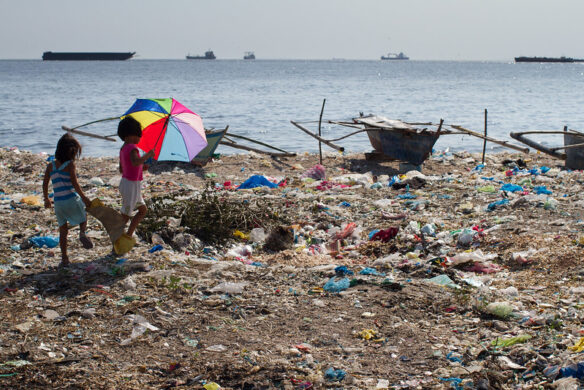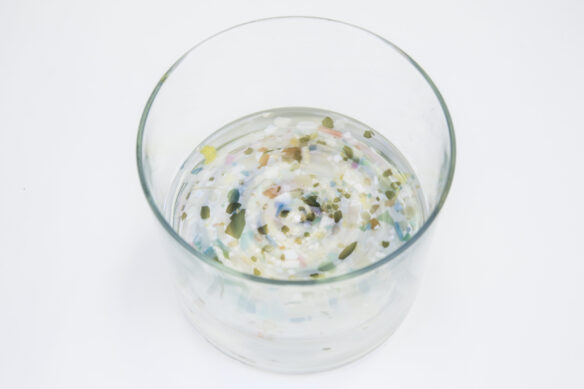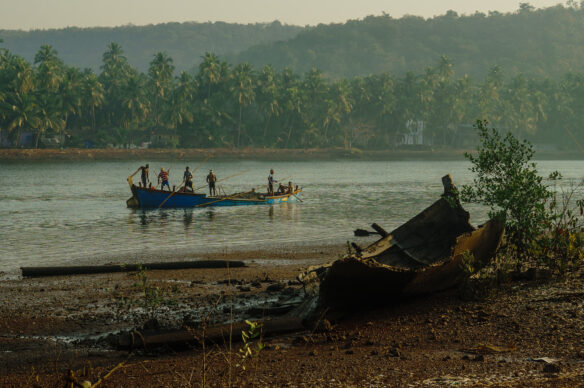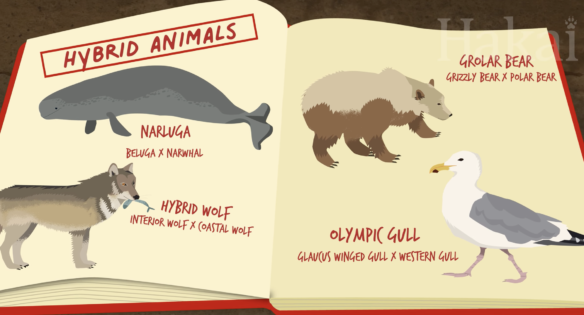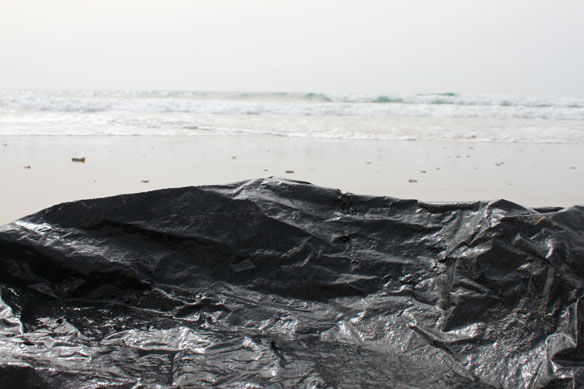
Plastic pollution. Photograph: © SAF — Coastal Care
A Speech by Janez Potočnik, European Commissioner for Environment, Berlin, 12 April 2013
“Let me start by welcoming the ‘Message from Berlin’ and expressing my appreciation for your work. Thanks to the commitment of people like you, the issue of marine litter is now high of the political agenda. This is something we can all be proud of…. something which gives me satisfaction.
I must say that the file has progressed very quickly in the last couple of years.
I remember, that in 2010, during the OSPAR Ministerial Conference in Bergen, we were ‘served’ a plastic breakfast, comparable to what a local seabird, the Northern Fulmar, has on average in its stomach. That breakfast was not easy to digest.
Two months later I met Captain Charles Moore, the person who identified these large ocean systems of rotating currents and the so-called “plastic soup” which is created by our waste. I was shocked by the extent of the problem of marine litter all over the world.
The Rio+20 Summit last year showed the extent to which marine litter has now become an issue of truly global concern. It was the only new target agreed by the international community. At Rio, we committed to take action and come to a significant reduction of marine litter by 2025.
In line with that commitment, the European Commission suggested, in its proposal for a 7th Environment Action Programme, the setting-up of an EU-wide quantitative reduction target for marine litter.
In a nutshell, in less than 3 years, our focus has shifted from problems to solutions. This is an achievement in itself.
But one can say that marine litter is…. unfortunately…. emblematic of our wasteful economy.
The EU economy still generates far too much waste: we use 16 tons of resources per person per year, of which 6 tons go to waste. We cannot afford to go on like this! Using resources in a more efficient way is not only a moral duty but it is also an economic imperative if we want to overcome the current crisis and re-orient our economies towards long-term sustainable growth.
I would like to see an economy which minimises waste; one which uses just the amount of resources that are needed; one that stops wasting our resources!
Marine litter is… again unfortunately… also emblematic of totally inadequate waste management on land. We all know that 80 % of marine litter is estimated to come from land-based sources. Most of that litter is plastic waste. This clearly means that our priority has to be a comprehensive approach that targets plastic waste.
Last month, the European Commission published a Green Paper on a “European strategy on plastic waste in the environment”. The purpose is to open the discussion on the best way forward to tackle all aspects of plastic waste, including new ways to increase recycling and waste prevention. Later this year, on 30 September, we will hold a conference on the results of the consultation. And the outcomes will feed into the waste review which I announced for 2014.
Litter prevention is not a far‑fetched concept; it is actually happening! I am proud to say that my own country, Slovenia, is one of the front-runners. In 2010 and 2012, an initiative named “Let’s Do It! Slovenia” mobilized nearly 15% of the country’s population during one day to clean up the rubbish dumped in the countryside and in towns and cities. I was among that 15% and can assure you that the real change was in peoples’ minds. The real change is in their awareness of waste and what it does to our countryside and our seas. Clean-up campaigns are formidable tools to raise public awareness and involve citizens, and this is why I have been promoting a Clean-Up Day at EU level. People actually like to be involved and should be, because without them no policy can be successful. Change needs to go beyond legislation.
The private sector, and in particular the packaging industry, also has a key role to play. Nearly 60 % of our plastic waste is packaging waste. Industry has to be part of the solution.
We need to make a distinct effort to reduce “over-packaging”. The objective should be to package as smart as we can. Packaging is fine where it clearly serves a useful purpose but it should be avoided where it is simply superfluous.
At the same time, we need to increase the recycling of plastic packaging. Recycling starts in the product design phase. Plastic packaging should be designed in a way that it is easily and efficiently recycled. For example, recycling can be made easier by avoiding dark pigment that is difficult to remove and results in ‘unattractive’ grey recycled plastics; plastics should be chemically simpler and cleaner; and multi-layer packaging material should be designed in a way that it does not hamper recycling.
As I said, litter prevention is very successful in some Member States, we need to learn from them. I know that you are already bringing together many experiences and best practices. I am sure that one common feature of success is a well-functioning waste management infrastructure – regular waste collection, separate collection bins, public waste collection points for glass, metal, paper, solvents, bulky rubbish. All of these mean less littering.
But to address marine litter in our seas, we need to go a step further. We need more and stronger cooperation at the regional level and at the global level. In our Roadmap “Towards a Resource Efficient Europe” published in 2011, we committed to contribute to the development of the regional action plans. The further development of these regional action plans on marine litter during this conference, with a very active involvement of the four regional seas conventions is a good example of how to cooperate within the European context.
We also want to extend this promising cooperation to the global level. And I am very pleased to see that UNEP is using this conference for the further development of the Global Partnership on Marine Litter.”
Original Article and Learn More, Europa
What should we do about plastic waste? New Green Paper opens EU-wide reflection
European Commission, Press Release, Europa
Plastic has become an unavoidable material in our modern world. Plastics are versatile and durable, but this durability can make disposal problematic. A Green Paper published by the European Commission March 7th,2013 aims to launch a structured discussion about how to make plastic products more sustainable throughout their life cycle and reduce the impact of plastic waste on the environment.
Environment Commissioner Janez Potočnik said: “Managing plastic waste is a major challenge in terms of environmental protection, but it’s also a huge opportunity for resource efficiency. In a circular economy where high recycling rates offer solutions to material scarcity, I believe plastic has a future. I invite all stakeholders to participate in this process of reflection on how to make plastic part of the solution rather than the problem.”
Once in the environment, particularly in the marine environment, plastic waste can persist for hundreds of years. Up to 10 million tons of litter, mostly plastic, end up in the world’s oceans and seas annually, turning them into the world’s biggest plastic dump.
Plastic is often perceived as a cheap and disposable material in our “throw-away” society, and recycling rates are low. Half of all plastic waste generated in Europe goes to landfill, which should be avoided as plastic can contain hazardous components and disposal can result in undesirable emissions and concentrated, polluting residues.
The Green Paper underlines the key role that plastic plays in many industrial processes and applications, and the potential economic gains of higher recycling rates. As the world population grows and natural resources become scarcer, recycling plastics will be an alternative to the exploitation of virgin resources. To speed this change, better framework conditions are needed to support eco-design and environmental innovation, with waste prevention and recycling factored in to the design of plastic products.
The particular challenges posed by plastic waste are not specifically addressed in EU waste legislation at present. Member States should favour prevention and recycling over other modes of disposal, as is the case for all waste streams referred to in the Waste Framework Directive, but clearly more is needed. The Green Paper aims to gather facts and views in order to assess the impacts of plastic waste and define a European strategy to mitigate them. Stakeholders are invited to contribute their views on whether, and how, existing legislation should be adapted to deal with plastic waste and promote re-use, recycling and recovery of plastic waste over landfilling. Views are also sought on the effectiveness of potential recycling targets, and of economic measures such as landfill bans, landfill taxes and pay-as-you-throw schemes. The Green Paper also asks how to improve the modular and chemical design of plastic to improve recyclability, how to reduce marine litter and whether there is a need to promote biodegradable plastics.
Next steps
The consultation, which includes 26 questions, will last until the beginning of June 2013. The result will feed into further policy action in 2014 as part of a broader waste policy review, which will look in particular at the existing targets for waste recovery and landfill as well as an ex-post evaluation of five directives covering various waste streams.
Background
Within a little more than one century plastic has become indispensable in modern engineering and construction for mass production of consumer goods. In only 50 years, world-wide plastic production has increased from 1.5 million tonnes per year in 1950 to 245 million tonnes in 2008, a trend that is expected to continue. The marine environment is particularly vulnerable to plastic waste. Plastic waste forms 80 % of the enormous waste patches in the Atlantic and the Pacific oceans, which cause sea species to suffer from entanglement or ingestion. The presence of plastic residues, even in the most remote areas of world seas and shores shows that there is a price to pay for the excess of plastic waste. Conventional plastic also contains a large number, and sometimes a large proportion of chemical additives which can be carcinogenic, provoke other toxic reactions or act as endocrine disruptors.
Some strategic elements to tackle plastic waste in the environment already exist in present waste legislation. The Waste Framework Directive (2008/98/EC) focuses on elements such as life cycle thinking, waste prevention over waste operations, extended producer responsibility, product design, resource efficiency and resource conservation. Moreover, the 2011 Roadmap to a Resource Efficient Europe and the 7th Environmental Action Plan, proposed by the Commission in 2012 and currently examined by the European Parliament and the Council, develop the reflection further to consider an EU-wide quantitative reduction target for marine litter…

